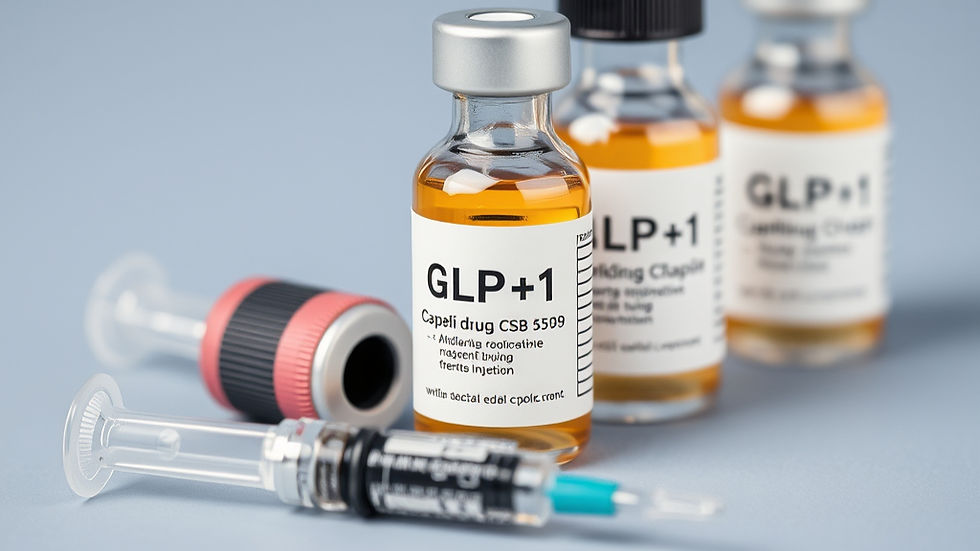Supplements: Do I need them?
- jberri12
- Jul 22, 2025
- 3 min read

Our bodies are composed of complex bio-mechanical processes. In the era I grew up, conventional wisdom was to take a multivitamin for "better health". I took them as a child, but stopped in my early 20's. I thought, "I don't need those any more".
As we age, our bio-mechanical processes degrade slowly. We also tend to develop bad nutritional habits. Soon our bodies are begin to develop imbalances, which in turn affect our body processes. By the time we reach mid-life, significant imbalances can start to lead to degradation of processes to the point where we start to damage our body, encouraging chronic issues to develop. This is where supplementation comes in. I look at it as "filling the gaps". Now you can improve your nutrition as well, but gaps may still remain, thus a potential need for supplementation.
The best way to understand your gaps is through blood tests. Those tests will show biomarkers that are out of normal range (high or low). Initially when I started to change my lifestyle, they showed I was low in vitamins D and B12. I started supplementation with those, and progressed from there. Check out my Vitamins, Minerals, and Supplements page for some of the supplements I take. For reference, a group of supplements you take is called a "stack".
Before you start any kind of supplementation, please read these important points:
Consult Your Primary Care Physician (PCP) Work with your PCP to understand your biomarkers. Follow their recommendations on diet, exercise and supplements to help address any issues. Using your age, medical history, and family history will help determine which supplements to add to your diet. Also formulations may vary (e.g. D3 vs D3+K2), so they can help you determine the best formulations and combinations. They can also determine which interactions to avoid, especially if you are taking prescription medications. In my case, I'm taking prescription high blood pressure medication, so I need to avoid supplements that interact and de-stabilize my blood pressure.
Base on Biometrics It's critical that your supplement regimen be based on actual data, not claims. Many supplements are unregulated, and make sometimes ridiculous claims of benefits. They need to be specific on how they address deficiencies in individual biomarkers.
Study and Research Even after consulting your PCP, study and research the supplements you intend to use. Introducing substances into your body without understanding their effects is a bad idea. Pay attention to interactions, side-effects, formulations, and vendor quality control.
Modify Nutrition and Physical Activity First Before you start any supplement regimen, modify your lifestyle first. Changes in nutrition and physical activity may provide enough benefit to negate the benefit of introducing a supplement.
Be Conservative When you are ready to start a new supplement, start conservatively. If the recommended dosage is 2 pills 2x a day, start with 1 pill 2x a day. Watch for interactions and side effects, and if there are any stop immediately. The more supplements you add to your stack, the more likely you will get interactions and side-effects. The goal is to optimize your biomarkers. You want to avoid over-use of supplements to get to where you want to be. Don't overdue it or you may get long-term negative effects.
Trial and Error You may need to make various adjustments each time you introduce a new supplement. A bit of experimentation may be required to adjust your stack to the right balance. Examples:
You have to adjust the recommended dosage for your needs
The formulation doesn't work for your body and needs to be changed
You get an interaction that requires you to adjust another supplement in your stack
Watch Out for Interactions Pay close attention your biomarkers once you introduce a supplement. Not only your blood tests, but blood pressure, sleep, temperature, pulse rate, and more subjective signs like concentration, mood, focus, etc. Let our body tell you if something is wrong. If you detect an issue with a new supplement, discontinue it and do both research and consult your PCP, if necessary.
No Miracle One Pill Fixes Be wary of hype regarding supplements. Claims can be blatantly false, reviewers can be paid to give a positive review, side-effects can be buried in the fine-print. Your body is unique, and how a supplement effects you varies from person to person. There is no "feel good" supplement out there, no matter what people or companies claim. Do your research, test, and decide for yourself.



Comments